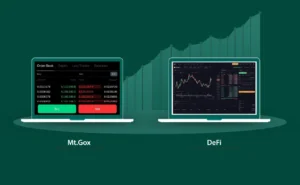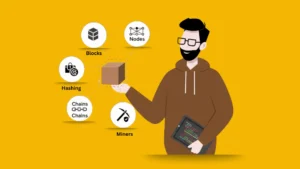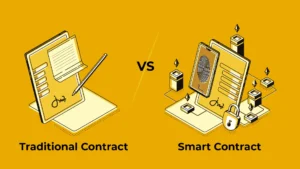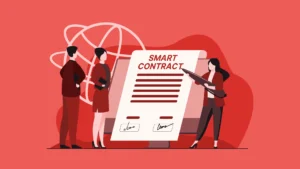
Business has always been built on trust. Whether it’s a handshake between partners or a legal contract on paper, the goal is always the same: to ensure that everyone does what they promised. But as industries grow and technology races forward, traditional contracts can’t keep up with the pace of modern business. Delays, human errors, and dependency on third parties often slow everything down.
That’s where smart contracts enter the story. They are not just pieces of code. They are a revolution in how agreements are made, executed, and maintained. And in the world of business automation, they are becoming the heartbeat of trust and efficiency.
I still remember working with a logistics startup a few years ago. Every time a client’s shipment was delayed, their payment schedule got messy. There were disputes, late invoices, and endless back-and-forth emails. Once they integrated smart contracts, those problems disappeared overnight. Payments were automatically released once GPS confirmed delivery. No chasing. No confusion. Just clean, trustworthy automation. That’s what business automation powered by smart contracts feels like, peaceful and reliable.
What are Smart Contracts in Business Automation
A smart contract is basically a digital agreement written in computer code that runs on blockchain. It automatically executes and enforces terms once predefined conditions are fulfilled, without needing human oversight.
Let’s say a supplier agrees to send 500 units of raw material to a manufacturer. Once the shipment is verified on the blockchain, the payment is released automatically. No follow-ups, no disputes, and no delays, that’s the beauty of smart automation.
In traditional business processes, automation tools like CRM or ERP systems still rely on central servers and third-party approvals. But with blockchain-based smart contracts, companies get a new level of autonomy, where trust is built into the system itself.
According to a detailed article by Corpgov Law, smart contracts are helping corporations automate key processes while reducing risks of fraud and manual errors. That’s the true power of automation, it doesn’t just make tasks faster, it makes them more reliable.
Why Smart Contracts Matter for US Businesses
In the USA, more companies are using smart contracts to save time and build trust. They help run tasks automatically without needing anyone to watch or approve.
Smart contracts work on blockchain. Once conditions are set, they follow the rules and finish the task. No one can delay payments, change data, or stop the process.
- No Middlemen Needed
Smart contracts remove third parties like banks or agents. Businesses can deal directly and save money by cutting extra fees and long approval times. - Faster Process
These contracts run 24/7 without breaks. Payments, approvals, and updates happen instantly, helping companies work faster and serve customers better. - Lower Costs
Businesses save a lot because there’s no paperwork or middle agents. Everything happens online, safely and quickly, reducing the total cost of doing business. - Clear and Honest Records
Every action is stored on the blockchain and cannot be changed. This gives complete honesty and trust between business partners and clients. - Safe and Secure
Smart contracts use strong blockchain security. This protects all important data from hackers, keeping business information private and safe from any tampering. - Easy Global Deals
Smart contracts allow U.S. businesses to work with anyone in the world. No currency issues or waiting for approvals, just quick, direct, and transparent payments. - Peace of Mind for Business Owners
Smart contracts bring a sense of relief. Owners feel safe knowing everything runs fairly and automatically, with no cheating, delays, or manual mistakes.
Smart contracts are changing how American businesses work. They make operations faster, safer, and more transparent, helping every company move confidently toward the future.
Smart Contracts vs Traditional Automation
You might be wondering, “We already use automation tools. Why do we need smart contracts?”
Good question. Traditional business automation tools are rule-based but still require a central authority to manage them. Smart contracts, on the other hand, operate on decentralized logic, meaning they don’t depend on a company’s internal server or administrator.
| Feature | Traditional Automation | Smart Contracts |
|---|---|---|
| Control | Centralized | Decentralized |
| Trust Model | Based on intermediaries | Based on blockchain logic |
| Execution | Manual or semi-automated | Fully automatic when conditions are met |
| Cost Efficiency | Moderate | Highly cost-effective |
| Transparency | Limited | Fully traceable and immutable |
| Speed | Depends on human input | Instant, 24/7 execution |
This difference creates a huge competitive edge for businesses adopting blockchain-based automation. They not only streamline processes but also gain a transparent and verifiable system, something regulators and partners both appreciate.
[Also Read: How Smart Contracts Differ from Traditional Software]
Benefits of Smart Contracts in Business Automation
Once a condition is met, the contract is executed immediately. Because smart contracts are digital and automated, there’s no paperwork to process and no time spent reconciling errors that often result from manually completing documents.
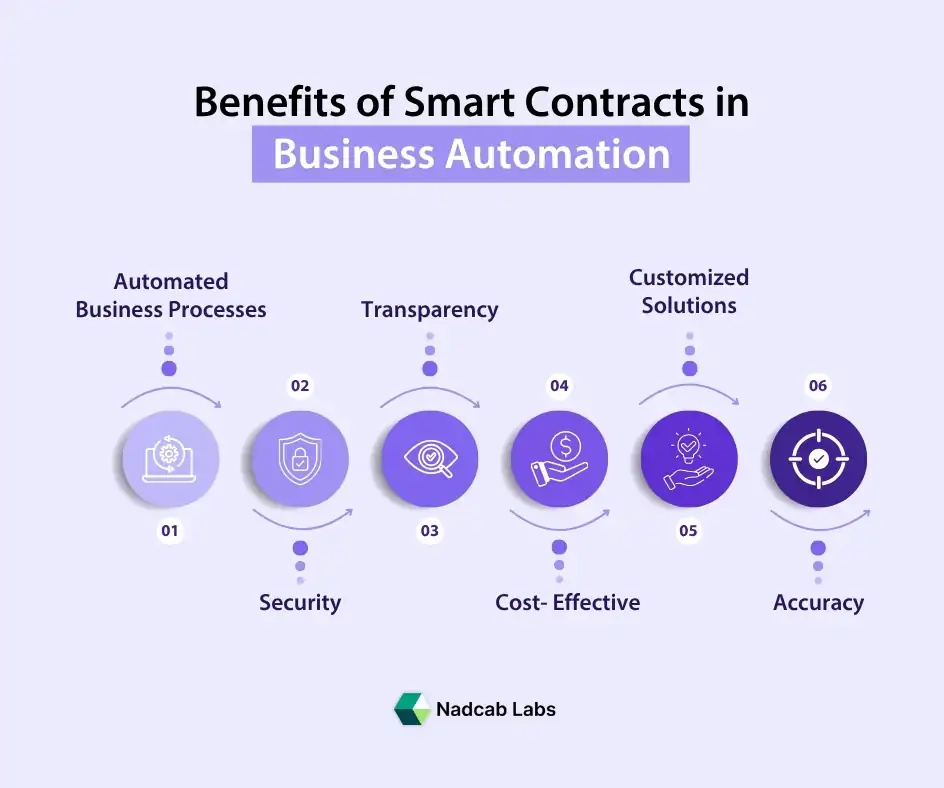
1. Transparency that Strengthens Relationships
Every successful business relationship depends on trust. In traditional systems, one party often has to depend on another’s honesty or manual confirmation. This dependence sometimes leads to delays or manipulation.
Smart contracts remove that uncertainty. Once the rules are coded, everyone can see them. Every transaction is recorded on the blockchain and visible to authorized participants. This means no one can secretly change details or hide actions.
Transparency builds confidence. When both sides know that everything is clear and tamper-proof, collaboration becomes smoother. Companies no longer waste time verifying what’s already visible. In industries like finance, supply chain, and logistics, this transparency becomes a competitive advantage.
As highlighted by 101blockhains, smart contracts are revolutionizing supply chains by making each step, from manufacturing to final delivery, visible and verifiable in real-time. This level of honesty keeps every player accountable.
2. Reducing Costs and Eliminating Middlemen
In the old world of business, contracts needed lawyers, accountants, notaries, and banks to ensure that everything ran smoothly. While these intermediaries added security, they also added cost and time.
Smart contracts cut out that middle layer. Since they operate automatically on blockchain, businesses can transact directly with each other. Payments, agreements, and approvals happen instantly and securely.
For startups and small businesses, this is a big deal. Instead of paying hefty fees to third parties, they can rely on the code to handle transactions. For large enterprises, it means reducing overhead costs and speeding up multi-department processes.
This doesn’t mean human experts become irrelevant. It means their roles shift to higher-value work, like strategy and innovation, instead of chasing documentation or signatures.
3. Speed and Accuracy that Save Time
Every second matters in modern business. Traditional contract processing can take days or even weeks. People have to verify documents, approve requests, and process payments. Every manual step increases the chance of mistakes.
Smart contracts change that completely. They execute actions instantly once conditions are met. No emails, no approvals, no delays. The speed is astonishing, what used to take days now happens in minutes.
I remember a real estate company automating its rental agreements using smart contracts. Tenants could sign leases digitally, and once payments were received, smart contracts automatically updated the ledger and issued digital receipts. The team saved hundreds of hours each month.
Moreover, according to the binmile blog on smart contracts, these contracts are built to reduce operational friction by automating complex workflows and ensuring that business logic runs exactly as intended.
4. Security that Never Fails
When you’re handling sensitive data or high-value transactions, security is everything. One of the most powerful features of blockchain technology is that once a smart contract is deployed, it cannot be altered or deleted without consensus.
This immutability makes smart contracts incredibly secure. Hackers cannot simply go in and change records. Every block in the blockchain is connected to the previous one, making the entire structure resistant to tampering.
For companies that deal with confidential data , finance, healthcare, logistics, this security means peace of mind. Data breaches are expensive and reputation-damaging. Smart contracts reduce that risk by design.
They also eliminate the risk of fraud. Since every step is recorded and verified by multiple nodes across the network, no single actor can manipulate the outcome.
5. Increased Efficiency in Multi-Party Collaboration
Many businesses involve multiple partners, including suppliers, vendors, distributors, and clients. Coordinating all of them manually can be messy. Miscommunication or delays can easily disrupt the entire chain.
Smart contracts ensure that everyone operates based on the same set of transparent rules. They automatically trigger events like shipment verification, payments, or approvals when pre-set conditions are met.
Imagine a global trade agreement between five companies across three countries. Normally, there would be paperwork, legal checks, and endless verifications. With smart contracts, everything can happen automatically, saving time, reducing errors, and increasing accountability.
6. Accuracy and Elimination of Human Error
Mistakes happen, people misread clauses, forget to update data, or make typos. In business, such small errors can cause massive financial losses.
Smart contracts remove this risk. They do exactly what they’re programmed to do. Once deployed, they follow logic without bias or fatigue. This accuracy ensures that every transaction is consistent and error-free.
Think about insurance claims. Normally, each claim must go through multiple checks. With smart contracts, a claim can be automatically validated once the required conditions, like proof of loss, are met. The payout is released instantly, ensuring fairness and satisfaction.
7. Better Customer Experience
Customers today expect speed, fairness, and transparency. They don’t want to wait for confirmations or deal with unclear policies.
With smart contracts, businesses can deliver a frictionless experience. Refunds, renewals, rewards, and digital ownership transfers can all be handled automatically. This kind of smooth experience builds trust and loyalty.
A customer who doesn’t have to chase support for updates is a customer who’ll stay longer.
8. Empowering Global Trade and Cross-Border Operations
Global businesses often struggle with cross-border regulations, exchange rates, and verification delays. Smart contracts simplify this by using blockchain as a neutral platform that operates across borders.
They can manage multi-currency payments, track international shipments, and execute agreements between parties who have never met, all while maintaining full transparency.
For exporters and importers, this means faster settlements and fewer disputes. For regulators, it provides a verifiable trail of transactions that’s easy to audit.
Smart Contracts Focused Industries
Smart contracts are already transforming industries like finance, insurance, logistics, real estate, and healthcare.
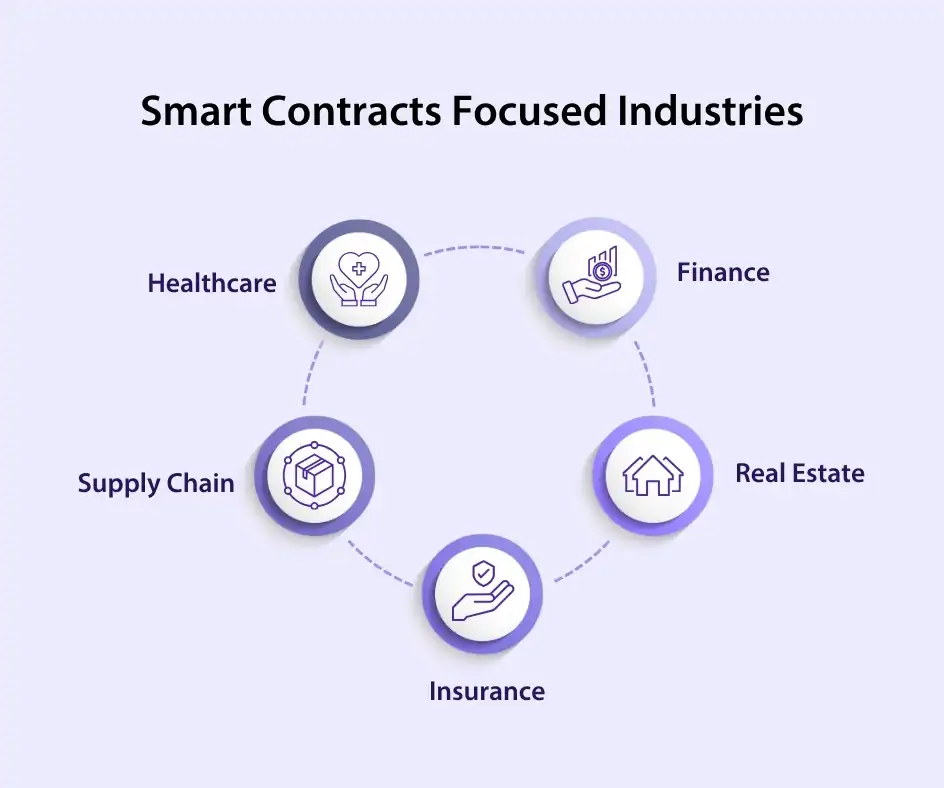
- Finance: Automatic payments, transparent loans, and decentralized trading.
- Real Estate: Secure property transfers without agents or delays.
- Insurance: Automated claims processing that eliminates fraud.
- Supply Chain: Real-time tracking and transparent delivery systems.
- Healthcare: Safe sharing of patient records and transparent billing.
Every use case adds more trust, speed, and transparency. And the beauty is that these solutions scale globally without extra human effort.
[Also Read: The Ultimate Guide to Applications of Smart Contracts in Various Sectors]
The Future of Business Automation with Smart Contracts
The future of business automation is not just digital, it’s trustless. Smart contracts are evolving to work alongside artificial intelligence and Internet of Things devices. Soon, your car could automatically pay for tolls, or your energy meter could execute payments based on usage data.
But beyond technology, this shift represents a cultural change. Businesses are moving from dependency and verification to transparency and self-assurance. Deals will be made faster, executed instantly, and verified by systems instead of signatures.
This doesn’t just change business processes; it changes how people feel about doing business. Trust, once the hardest thing to build, will become the easiest part of every transaction.
Build Smart Contracts the Easy Way
With Nadcab Labs, you can create simple, secure, and fast smart contracts — automated systems that work on their own and make your business operations easier.
Build Trust and Save Time with Smart Contracts Today!
At first glance, smart contracts look like technology. But when you look closer, you realize they’re about something, human trust and freedom.
They don’t just automate transactions; they remove doubt. They make people confident that what they agreed upon will happen, fairly, quickly, and securely.
In a world full of complexity, smart contracts simplify life. They take care of repetitive work, prevent disputes, and build relationships rooted in transparency. For business owners, that’s not just automation, that’s peace of mind.
As we step into a future driven by automation and blockchain, the businesses that embrace smart contracts early will be the ones that thrive. Not just because they save time or money, but because they create a culture of honesty, clarity, and efficiency.
Frequently Asked Questions - Smart Contracts
What are smart contracts?
Smart contracts are digital agreements that work on blockchain technology. They automatically execute tasks when certain conditions are met without needing a middleman. This makes transactions faster, safer, and more transparent. For businesses and individuals, smart contracts build trust, prevent fraud, and ensure that every deal happens exactly as planned in a secure and reliable way.
What are the uses of smart contracts?
Smart contracts are used in various industries to automate payments, manage supply chains, handle insurance claims, and process real estate deals. They remove the need for manual work and reduce errors by executing actions automatically. Businesses rely on them to save time, cut costs, and make sure every process is transparent, accurate, and efficient.
Who needs smart contracts?
Smart contracts are useful for anyone who wants secure, quick, and trustworthy transactions. Startups, finance companies, healthcare firms, and logistics providers use them to reduce paperwork, cut costs, and avoid fraud. They help automate routine business operations while maintaining full trust, accuracy, and transparency between all parties involved in an agreement.
What are the benefits of smart contracts?
Smart contracts make business operations faster, cheaper, and more secure. They remove middlemen, reduce costs, and prevent fraud by ensuring agreements execute automatically when conditions are met. Every transaction is recorded on the blockchain, so it cannot be changed. This transparency helps businesses build trust and save time on repetitive tasks.
How do smart contracts enable business process automation?
Smart contracts automate business workflows by executing tasks instantly once the required conditions are met. They can send payments, update records, and confirm deliveries without human help. This reduces mistakes, speeds up operations, and improves accuracy. Businesses can focus on innovation and growth while smart contracts handle the routine processes automatically.
What is a key benefit of using contract AI?
Contracts AI makes managing agreements easier and smarter. It can detect risks, fix errors, and ensure compliance automatically. Businesses save time, reduce legal issues, and increase accuracy with AI support. By handling complex tasks efficiently, Contracts AI helps teams work faster and build stronger, more reliable partnerships with clients and partners.
Are smart contracts actually useful?
Yes, smart contracts are very useful for modern businesses. They make online transactions faster, cheaper, and safer. Companies use them to remove intermediaries, automate workflows, and prevent fraud. Because they are transparent and tamper-proof, smart contracts bring trust and peace of mind to everyone involved in digital transactions or agreements.
What is the best smart contract?
The best smart contract platform depends on what you need. Ethereum is popular for flexibility and strong developer support. Polygon, Solana, and Binance Smart Chain are faster and more affordable options. The choice depends on your project size, speed requirements, budget, and the type of decentralized applications you plan to build.
Why do businesses need to rely on contracts?
Contracts create trust between parties by clearly defining responsibilities and expectations. They prevent confusion and protect both sides from legal or financial risks. Whether in traditional or blockchain form, contracts ensure that business relationships stay fair, transparent, and reliable. They are the foundation for smooth communication and secure collaboration.
What problems do smart contracts solve?
Smart contracts solve problems like fraud, human error, and slow manual processing. They automatically carry out agreements once all terms are met, eliminating middlemen and unnecessary delays. Since everything is recorded on a blockchain, transactions become secure, transparent, and tamper-proof, helping businesses save time and build long-term trust with clients.


